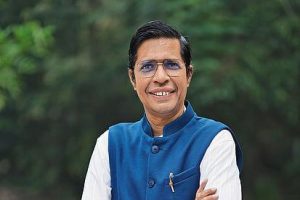
India is set to lead the digital era with homegrown innovation, robust connectivity, and progressive policies driving its rise as a global technology powerhouse, Hon’ble Minister, Jyotiraditya M. Scindia, Minister of Communications; Development of North Eastern Region, Government of India at AIMA’s 10th National Leadership Conclave.
For decades, we’ve asked a question that echoed with hope: When will India rise? Today, in a world gripped by volatility, realignment of supply chains, and geopolitical flux, I believe the answer is clear—India’s rise is here, now, and unstoppable.
I often describe this moment in India’s journey through the analogy of the blockbuster film RRR. Like that cinematic triumph, India’s rise is Real, Rapid, and Resolute. Once listed among the “fragile five,” we’ve now surged from being the world’s 11th largest economy to the 5th, on track to overtake Germany and Japan by 2028. With a GDP approaching $4 trillion, we’re projected to grow to $6 trillion by 2030.
This transformation isn’t about short-term spikes—it’s the power of compounding. The U.S. didn’t become an economic giant through breakneck growth, but through consistent 3–4% growth over a century. India is on a similar trajectory, averaging nearly 8% decadal growth, which has pulled 250 million people out of poverty, birthing a confident and capable middle class.
What’s powering this rise? A decisive shift from revenue-based spending to capital investment. We’ve leapt from ₹1.5 lakh crore to ₹11 lakh crore in capital expenditure in just a decade. For every ₹1 invested, we’re generating up to ₹4.8 in long-term returns. That’s not just economics—it’s vision in action.
India today is not just confident, connected, and courageous—we’re also innovating across sectors. From embracing millets in agriculture to promoting spiritual wellness through International Yoga Day, our soft power is creating global impact. We’re not just exporting products—we’re exporting paradigms: organic farming, hospitality rooted in Atithi Devo Bhava, and a value-led approach to business.
Connectivity is another game-changer. The Northeast, once underdeveloped, is becoming a strategic hub with 17 airports and improved rail and highway links. This region will soon be a vital connector to Southeast Asia. Under Prime Minister Modi’s leadership, we’re building not just roads, but bridges to opportunity.
The telecom revolution tells a similar story. In just 22 months, we’ve achieved the fastest 5G rollout in the world, covering 99% of districts and reaching 82% of the population. With affordable data, digital highways like UPI and India Stack are reshaping financial ecosystems—46% of the world’s digital transactions happen right here.
And in this narrative, India Post is being reimagined as a rural fintech engine, turning a 164,000-strong network of post offices into touchpoints of economic inclusion.
So yes, this isn’t just India’s decade—it’s India’s century. A nation that once relied on the world (Vishwa par nirbhar) is now becoming a nation the world relies on (Vishwa Bharat pe nirbhar). From the digital frontier to the spiritual heartland, we are a country reclaiming our place in the global order—not just through potential, but through performance.
Together, let’s march forward—boldly, united, and audaciously.
Watch the full session- https://www.youtube.com/watch?v=E8cwfyWDTp0&t=427s












